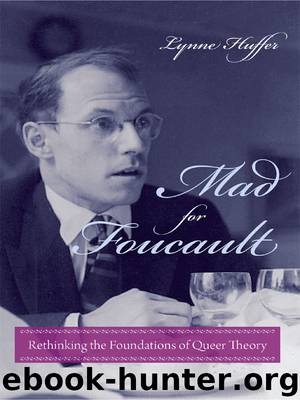Mad for Foucault by Lynne Huffer

Author:Lynne Huffer
Language: eng
Format: epub
Tags: PHI027000, Philosophy/Movements/Deconstruction, LIT004160, Literary Criticism/Gay and Lesbian
Publisher: Columbia University Press
Published: 2009-11-01T04:00:00+00:00
The Psychic Life of Identity
This chapter’s return to Madness for its historicization of a psyche-logos we all inhabit is motivated by my sense of an ethical impasse specific to the present moment. That sense of impasse, or even exhaustion, is evidenced by an abandonment of politics in some quarters and a return to ethics in contemporary critical theory. My purpose in this section of the chapter is not to uncover all the paradigmatic instances in which queer theory reveals itself to be both Foucauldian and psychoanalytic. Indeed, the claim that queer theory has comfortably and almost invisibly settled into its Freudo-Foucauldian foundations is, I believe, indisputable. Even when Freud and Foucault are not explicitly cited, the implicitly Freudo-Foucauldian conceptual combinations that pepper queer discourse—“jouissance” with “historical consciousness,”59 Žižekian “symptoms” with “normativity,”60 the Lacanian “given-to-be-seen” with the material “archive,”61 Freudian “erotogenicity” with Foucauldian “pleasure”62—attest to the phenomenon of the theoretical melding that characterizes queer “scavenger” theory. In that context, any project to obsessively ferret out the most egregious examples of such amalgamations would miss the Foucauldian point about the psychological “confiscation” of the human sciences, of which psychoanalysis is a part, that affects queer theory no less than other humanist projects. Indeed, as the manifestation of a confiscation, Freudo-Foucauldianism may be less a coupling than the most recent “episode,” to use Foucault’s word, of a hostile takeover that began when Descartes first exorcized madness from the cogito.
Despite the seeming no-win scenario of a modern knowledge project where we live in Freud like fish in water, I continue to argue that unreflective amalgamations of Freud with Foucault need to be questioned. For, if alterity itself has been confiscated by the sciences of the psyche, all the more reason to find alternative ways from within that confiscation to access the differences alterity names. That search for an alternative to the psychological models of Foucault’s early training constitutes one of the vibrant threads that runs through his life’s work. In that spirit, this book’s restorative and revitalizing impulse has been driven, from its inception, by what I can only call a loyalty to Foucault and the archival specificity of his lifelong project. That loyalty is in part a response to the many readings of Foucault—some of them breezy, some of them serious—that collapse his uniquely generative work into, among other things, linguistic structuralism, Derridean deconstruction, and Freudo-Lacanianisms of various forms. Most important for the project of this book, loyalty names my inchoate but insistent sense that queer theory has eaten prodigiously of that juiciest of fruits we call Foucault, but has somehow not taken in, much less digested, the consistent critique of psychoanalysis to be found there.
Beyond loyalty, I want to uncouple the Freudian from the Foucauldian because I think their separation will be useful for the political and intellectual project of queer theory. Comparing his books to toolkits, farmers’ shoes, or firecrackers, Foucault expressed his hope that they would “disappear” into the uses that might be made of them. And if Sexuality One
Download
This site does not store any files on its server. We only index and link to content provided by other sites. Please contact the content providers to delete copyright contents if any and email us, we'll remove relevant links or contents immediately.
| African-American Studies | Asian American Studies |
| Disabled | Ethnic Studies |
| Hispanic American Studies | LGBT |
| Minority Studies | Native American Studies |
Cecilia; Or, Memoirs of an Heiress — Volume 1 by Fanny Burney(31374)
Cecilia; Or, Memoirs of an Heiress — Volume 3 by Fanny Burney(30969)
Cecilia; Or, Memoirs of an Heiress — Volume 2 by Fanny Burney(30923)
The Great Music City by Andrea Baker(22332)
We're Going to Need More Wine by Gabrielle Union(18109)
Bombshells: Glamour Girls of a Lifetime by Sullivan Steve(13141)
Pimp by Iceberg Slim(12972)
All the Missing Girls by Megan Miranda(12811)
Fifty Shades Freed by E L James(12478)
Talking to Strangers by Malcolm Gladwell(11950)
Norse Mythology by Gaiman Neil(11938)
Crazy Rich Asians by Kevin Kwan(8393)
Mindhunter: Inside the FBI's Elite Serial Crime Unit by John E. Douglas & Mark Olshaker(7873)
The Lost Art of Listening by Michael P. Nichols(6510)
Enlightenment Now: The Case for Reason, Science, Humanism, and Progress by Steven Pinker(6434)
Bad Blood by John Carreyrou(5801)
The Four Agreements by Don Miguel Ruiz(5551)
Weapons of Math Destruction by Cathy O'Neil(5075)
We Need to Talk by Celeste Headlee(4902)
